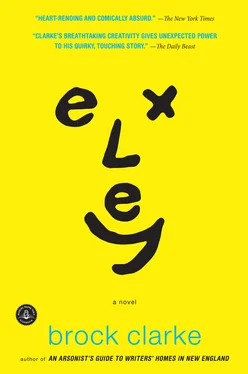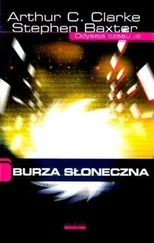“Hi, Mrs. C.,” J. said.
“Hi,” I said. “How’s my dad doing?”
“Oh, he’s still kicking!” Mrs. C. said, but she was back looking at her computer screen.
The swinging doors were in front of us. I pointed at them and said to J., “My dad’s room is through there.”
“Well, my father is on the second floor,” J. said, and started walking toward the elevator. The way she emphasized the word “second” made me think the patients on the second floor were different from the patients on the first, and that made me wonder: How bad off was my dad? Was he better or worse than the other patients?
“Hey,” I said. “Can I come with you?”
“Why?”
“I don’t know,” I said. I tried to come up with a reason. “I just don’t think I’ve ever met your dad before,” I finally said.
“I’m pretty sure you haven’t,” J. said. She pushed the Up button and waited. The elevator doors opened. She walked in the elevator and then turned to face me. She was touching her scar again, but she was also smiling. “I guess that’d be OK,” she finally said. The doors started closing. She put her hand in between them; they stopped, then reopened, and I got in.
The elevator door opened and we got out and walked down the hall. It was full of patients. They were getting their exercise. The patients with two legs were walking on their own or with their arms hooked through the arms of nurses, or wives, or husbands, or physical therapists. I saw a lady on crutches; she had one leg. That leg was on the floor, obviously, or at least its foot was. The other leg was almost completely gone: the leg of her pajamas was folded up to the middle of her thigh and pinned there. When she swung on the crutches, the pinned pajama leg flared to the side. Her pajamas were pink with flowers; there were towels folded at the top of each crutch, over the rubber part that went under the armpit. The towels were pink, too. There was a man next to her. He was using a walker, although he had two legs. I wondered what was wrong with him, until I noticed there was a tube running out of his stomach, into a clear sack attached to his walker. The tube was very wide and the sack was very big and both were filled with something that was the color of mud. It looked too brown and murky to be blood, but I didn’t know what else it could be. The man was doubled over a little, and every time he moved the walker, the tube swung and the man made a hissing sound behind his teeth. The man and the woman were standing really close to each other, even though the sack was on the woman’s side of the walker. My first thought was that she must have been really in love with him to be standing that close to the sack. But maybe they were only standing so close to each other because the hall was so crowded.
Because it was crowded. Full of people who seemed normal enough except for one or two things that made them much different. It was like walking through a mall in a foreign country. I was happy to have a guide. I followed J. as she snaked in and out of the crowd. The hallway was in a U shape. She walked down one side of the hallway, around the curve of the U, then stopped at the second door. I stopped a few steps behind her, because now that we were here, I wasn’t sure she’d really want me to come in. But she turned and waved at me to come on. So I did.
This is what I saw. I saw J.’s father lying belly-down on the table. The table was on wheels and was next to J.’s father’s bed, which was also on wheels. J.’s father was more or less as old as my dad. He was unshaven. When my dad didn’t shave, he looked tough; J.’s father just looked dirty, even in the eyes, which were pale, pale blue and watery. Maybe because of the pain. Because J.’s father wasn’t alone. There was another guy, a nurse or a therapist, leaning over J.’s father, rotating his stumps. I don’t know how else to say it. He took J.’s father’s left stump in both his hands, rotated it clockwise a few times, then counterclockwise a few times. Then he put the left stump on the table, lifted the right one, and did the same. The stumps were wrapped in Ace bandages. I had two thoughts. First was, Thank God my dad isn’t as bad off as J.’s dad . And second: I wonder what his stumps look like under the bandages . I was staring at the bandages when J.’s father looked in my direction and caught me.
“I’m sorry,” I said. That startled the therapist. He dropped J.’s father’s right stump and looked at me. His eyes were a much darker blue, much more alert, much less watery. He had a crew cut, and his arms had muscles you could see even when he was just standing there and not doing anything physical. He looked more like a soldier than J.’s father did.
“Hey, J.,” the therapist said, like they were buddies. But J. didn’t say anything back, which told me they weren’t. She walked over and kissed her dad on the top of the head and said, “Hi, Daddy.” J.’s father turned his head to the right and smiled up at J., then looked at me and smiled, but the smile was different. Once, at school, I’d heard a kid griping about losing his baseball glove. In the middle of the gripe, another smaller kid walked by, a baseball glove tucked under his arm. The bigger kid smiled at the smaller kid like J.’s father smiled at me. The therapist was watching all this, but he clearly didn’t know what to make of it or me. “Hey,” he said to me.
“Hey,” I said back. The therapist seemed to want more from me than just that, though, so I also said, “I’m Miller Le Ray. J. and I are in advanced reading together. My dad is on the first floor.”
“Gotcha,” the therapist said.
“Knock, knock,” J.’s father said to me. His voice was rough and dry. I wondered when the last time he’d talked to someone was. I wondered if someone would even want to talk to him. His face was angry and tense.
“Daddy,” J. said.
“Excuse me?” I said. I mean, I knew what to say next, except I couldn’t imagine that’s what J.’s father wanted me to say next. But he did.
“As in the joke,” he said. “Knock, knock.”
“Daddy, ” J. said. This was clearly something her dad did — told knock-knock jokes to strangers — and I wasn’t sure if J. was mad or just pretending to be mad. She rolled her eyes at him, then at me, and so I knew she was just pretending.
“Who’s there?” I said.
“9/11.”
“9/11 who?”
An expression washed over J.’s father’s face — not outrage, but sadness and disappointment. Just like that, he became a totally different guy, in the face. He probably would have been a great actor if he hadn’t been missing both his legs. “You said you’d never forget,” he whispered. Then he laughed. It was the kind of joke the teller had to laugh at, because he couldn’t be sure anyone else would. J. didn’t laugh; maybe she’d already heard the joke. She did smile in kind of an “Oh, Daddy” way. I might have laughed if I knew J.’s father better and had been expecting the joke or something like it. But I didn’t, so I didn’t. The therapist sure didn’t seem to think it was funny, though. He put his hands on J.’s father’s stumps. His face looked determined. His biceps went to attention and stayed there, quivering. “Ready?” he said.
“Hell, no,” J.’s father said. But the therapist went back to rotating his stumps anyway.
I LEFT J.’s father’s room then and went out into the hall. J. followed me.
“Well,” she said, smiling, “that’s my dad.”
“I liked his joke.”
“Yeah,” J. said, rolling her eyes again, pretending to be sheepish. “He thinks he’s a card.”
“The therapist didn’t think he was a card.”
“The therapist is a” — and I could see J. struggling to come up with a word bad enough to describe the therapist that wasn’t so bad that she couldn’t say it. I’d never heard J. say a bad word in the two months I’d known her — “dick wad,” she finally said. I laughed because I could tell that she had never used the words before and had probably only read them scrawled in the bathroom or on the bus. She pronounced “wad” like it rhymed with “sad.” I suddenly liked her a lot. I looked at her closely; I guess I’d never done that before. She was pretty. She wasn’t pretty like K. or Mother. But she was very pretty, even with the scar. I wondered, for the first time, where she’d gotten it. It looked like what happened when you fall asleep on the couch and the cushion leaves a mark on your cheek. Except that mark goes away, and hers obviously hadn’t.
Читать дальше












